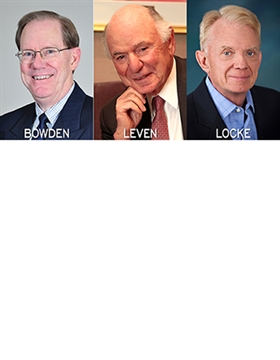Recorded Lectures
Lectures and Short (4 hour) courses given at Objectivist Conferences. The title and link for ordering are provided for each.
Rarely can one change one’s habits by direct will power because habits are subconsciously automatized; attempts to consciously suppress habits typically fail because suppression does not change the subconscious. This course shows that change has to go through stages: precontemplation, contemplation, action, learning techniques for attaining goals and dealing with setbacks.
The elements of each stage are explained. For example, for the precontemplation stage, students begin the process of learning how dysfunctional habits undermine their well-being by gathering information about the extent or effects of the habit, while for the preparation stage, students introspect regarding the emotions and thoughts that occur before, during and after we engage in a dysfunctional habit. During the action stage, students learn how to break down all habit-change goals into specific short-term goals that answer the what, when, how and where questions associated with the new goal and the importance of goal framing—that is, all “I should,” “I must,” “I have to” need to be replaced with “I want to,” “I choose to,” “I will” . . . do X (not a duty but a choice). In the techniques for change stage, students learn a host of techniques that have proven to be successful—these include: “surfing” your emotions while delaying action, forming implementation intentions made in front of the mirror, praising yourself for goal attainment out loud, developing one new, beneficial habit such as exercise to make it easier to change other habits, and so on. Finally, in the dealing-with-setbacks stage, we discuss the importance of self-forgiveness and making better plans and also how negative self-talk and global statements such as “I will never learn” normally cause one to be less motivated, less persistent and have less energy. In this stage, we identify some tricks that your subconscious may play on you that can lead you to stop progressing in your habit-change goal, for example, moral licensing, what-the-hell effect, the false-hope syndrome, and so forth.
In the end, students learn how to change habits not by attacking them directly but by using the various means learned in this course to weaken and replace them. If students follow the methods discussed in this course, they will have better self-control, better self-awareness (of emotions, desires, subconscious premises, conscious ideas), and a better life, but especially more happiness and pride in that they have effectively changed their behavior.
This course was recorded at the 2012 Objectivist Summer Conference in San Diego, CA.
(MP3 download; 3 hrs., 4 mins., 132.30 MB)
Available for $7 here

Since Jack Welch became CEO of General Electric in the early 1980s, the company has created more stockholder wealth than virtually any corporation in history. This course explores the rise of this extraordinary company over the past 20 years—and identifies exactly what made it possible.
The primary focus of the course is on Jack Welch in his role as leader. Dr. Locke discusses: Welch’s personal traits and his philosophy; the internal mechanisms GE uses to enhance its effectiveness-such as “work-out” and Six Sigma; GE’s competitive strategies; and the critics of GE.
(MP3 download: 6 hrs., 195 MB)
Available for $11.50 here.

Ford Motor Company, IBM and Dupont. By presenting the remarkable histories of these companies, this course illustrates the pivotal, creative role of business leaders.
(MP3 download: 4 hrs. 30 min., with Q & A, 131 MB)
Available for $9.00 here.

In this highly useful lecture, Dr. Locke applies Ayn Rand’s theory of volition to the process of study. The aspects of efficient studying that he addresses include:
- the choice of what to study;
- the choice of what goals to set (including their degree of specificity and difficulty);
- the choice of what factors to consider when choosing goals;
- the decision to commit oneself to one’s goals;
- the resolution of conflicts between one’s study goals and other values; and
- the actions taken to overcome failures to achieve one’s goals.
(MP3 download: 90 min., with Q & A; 63 MB)
Available for $3.98 here.

Making Your Life Happier By Making the Conscious and Subconscious Work Together
By Ellen Kenner and Edwin A. Locke
This course shows how attaining a better understanding of the relation of the conscious and subconscious enables you to achieve greater happiness. In the realms of work and career, this course shows how to identify the primary source of pleasure, and how to integrate that with other job aspects. In romance these lectures show how to separate initial attraction based on sense of life from infatuation, and, later, distinguish between core strengths in an existing relationship and areas to improve. In the area of friendship, this course shows how to differentiate between types of friends and levels of friendship. In addressing art, these lectures will ask people to identify the types of art they enjoy most (e.g., types of music) and what attributes attract them. In the realm of leisure, this course differentiates types (e.g., intellectual, skilled, physical, competitive, social) and the specific source of pleasure derived from each. Numerous class exercises are included to illustrate the points.
This course was recorded at the 2013 Objectivist Summer Conference in Chicago, IL.
(MP3 download: 151 MB)
Available for $7.00 here.

Panel titled “Interesting Trends in Contemporary Psychology” (2015)
By Matt Bateman, John Dennis, Gena Gorlin, Ellen Kenner, Edwin A. Locke, Lee Pierson.
Moderator: John Dennis
This panel was recorded at the 2015 Objectivist Summer Conference in Charlotte, NC.
(MP3 download: 72.30 MB)
Available for $3.98 here.

This course explores a number of management principles used by very successful business leaders. These principles pertain to such issues as:
- The nature and role of vision.
- The criteria for employee selection.
- How to motivate employees through goal-setting.
- The proper use of empowerment.
- Employee satisfaction.
- The importance of justice in reward systems.
- The proper use of teams.
- The role of communication.
- Effective decision-making.
These five classes offer advice that is valuable even outside of strictly business situations.
(MP3 download: 5 hrs., with Q & A, 210 MB)
Available for $11.50 here.

This is a presentation of the Objectivist view of emotions, a view which integrates reason and emotion, and which holds that emotions stem from an individual’s value-judgments—conscious or subconscious. Through a series of examples, Dr. Locke demonstrates that all so-called reason-emotion conflicts can be reduced to conflicts between ideas. He shows that emotions are the form in which one experiences one’s values, while it is reason that is man’s means of perceiving reality and of choosing proper values.
(MP3 download: 90 min., with Q & A, 61 MB)
Available for $3.98 here.

“How to Make Love Thrive” focuses, in detail, on how to love your soul mate. According to Drs. Locke and Kenner, to keep vitality and the spark in a romantic partnership, one cannot rely on feelings alone but must actively think about how to enhance the relationship. Topics include: the visibility principle, understanding your partner, encouraging your partner to pursue values, constant communication, showing concern for your partner’s welfare, showing generosity, encouraging joint decision-making and creating a positive emotional climate. All of this helps to produce emotional intimacy, the precondition of sexual intimacy.
“How to Enjoy Sex” focuses on creating the mood for sex, communicating about what each partner wants, prioritizing sex, afterplay and feedback, and avoiding subverters of sexual pleasure.
The instructors illustrate key principles by performing role-play dialogues, and participants are given exercises to enhance their ability to apply these skills to their own lives. The course is suitable for couples, including same-sex couples, and singles – anyone who wants to enhance a current relationship or acquire knowledge for a future one.
This course was recorded at the 2006 Objectivist Summer Conference in Boston, MA.
(MP3 download: 5 hrs., 54 min., with Q & A, 253.99 MB)
Available for $9.00 here.

Dr. Locke closely examines such issues as: Goal-setting in work and in romance; the integration of short-term and long-term goals; “feedback charts” and other devices for monitoring one’s progress; the need for well-defined objectives; and how to make difficult goals achievable.
(MP3 download: 1 hr., 29 min., with Q & A, 61.20 MB)
Available for $3.98 here.

This course is a major expansion of a talk by the same title given in 1985, focusing in depth on the topics of work and love. The work section discusses such issues as discovering what career you would like; healthy and unhealthy ambition; self-marketing; work vs. family; and money. The section of love contrasts the Objectivist view of love as egoistic to altruism and narcissism, and then presents numerous examples of what it would mean specifically to love someone egoistically, including the important role of the conscious mind in sustaining a romantic relationship.
(MP3 download: 4 hrs., 9 min., with Q & A, 161 MB)
Available for $7.00 here.

This course builds on Dr. Locke’s previous course, The Art of Introspection. The new course deals with more complex psychological issues that entail introspection. It presents a new theory of why people cry at happy events. It also covers: understanding complex emotions; understanding self-doubt and building self-confidence; protecting the integrity of one’s soul and one’s motivation to act in an irrational culture; seeking healthy, positive pleasures in life, including in art; and understanding what choosing to live really means (including the proper meaning of “the meaning of life” and its relationship to happiness).
This course was recorded at the 2009 Objectivist Summer Conference in Boston, MA.
(MP3 download: 4 hrs., 25 min., with Q & A, 182 MB)
Available for $7.00 here.

Stress is an element of life which everyone encounters and must deal with. This course provides a theoretical and practical approach to the subject.
Topics discussed include: the definition and symptoms of stress; the causal elements in the stress experience; coping techniques—including the formation of proper value hierarchies, problem-solving, skill-building and cognitive re-framing; and the role of social support.
(MP3 download: 4 hrs. 30 min., with Q & A, 175 MB)
Available for $7.00 here.

These four classes offer key insights into, and a vigorous defense of, four giants of America’s golden age—the age when individuals were free to achieve unlimited wealth in return for unprecedented achievement. The four figures are: John D. Rockefeller, J.P. Morgan, James J. Hill and Andrew Carnegie.
(MP3 download: 3 hrs, 59 min, with Q & A, 163 MB)
Available for $9.00 here.

This course focuses on four high-tech companies which have prospered in the last five to ten years, while others have failed or gone bankrupt. Dr. Locke discusses IBM, which floundered after the retirement of John Watson, Jr., and was saved from bankruptcy by Lou Gerstner; Intel, which became the leading chip-maker under the leadership of Andy Grove, but not before having to change its business radically; Microsoft, which came to dominate the computer software industry and was ruthlessly attacked by the government as a result; and eBay, which is one of the very few Internet companies to become profitable, thanks to the brilliant leadership of Meg Whitman. The course addresses not only the challenges that these companies faced, but also the causes of their successes.
This course was recorded at the 2003 Objectivist Summer Conference in Industry Hills, CA.
(MP3 download: 4 hrs., 56 min., with Q & A, 203 MB)
Available for $11.50 here.

This is the “trial” that did not take place—but should have.
Michael Milken was a financial genius who revolutionized investment banking. But his success generated an unrelenting crusade against him, leading to his indictment under a range of non-objective securities laws. Seeing no chance of acquittal, he pleaded guilty to six of the 98 counts.
Thus, Milken never had his day in court—until now. This mock trial features the closing arguments of the prosecution and defense, delivered before a judge and jury selected from the audience. The centerpiece is the defense summary, given by Dr. Locke (who conceived of this novel presentation). He rebuts the government’s case, identifies the philosophy behind the prosecution and ends with a moral justification of Milken’s actions.
(MP3 download: 90 min., with Q & A, 64.60 MB)
Available for $3.98 here.

This course is an introduction to introspection. It starts by defining introspection and showing that Ayn Rand’s introspective genius was critical to the development of Objectivism. It shows why introspection is important in a person’s life and why so few people do it and why so few are good at it. The course proceeds to identify seven principles to aid introspection and includes a series of exercises to help develop introspective skills. These exercises include: identifing things one likes, breaking complex ideas or experiences into smaller units, naming and understanding the causes of emotions, identifying patterns of emotional responses to one’s work and job, detecting and correcting defensive reactions, understanding one’s reaction to other people, integrating separate introspective observations into a whole and using one’s own actions as a clue to one’s values and value conflicts.
This course was recorded at the 2008 Objectivist Summer Conference in Newport Beach, CA.
(MP3 download; 4 hrs., 25 min., with Q & A, 191.02 MB)
Available for $9 here.

In this lecture Dr. Locke identifies the objective basis and critical psychological need of self-esteem, and examines four contemporary intellectual movements that – while sometimes claiming to build self-esteem – are working to destroy it. First among these are psychologists who claim that self-esteem is based on social approval, thereby encouraging people to become second-handers. In education the trend is to make students “feel good” by sacrificing academic standards, which makes students less competent to deal with reality. Dr. Locke also looks at the assault on self-esteem mounted by religionists, who advocate humility and faith, and by philosophers, whose persistent attacks on reason have resulted in widespread skepticism and moral self-doubt. The result of these influences has been the gradual destruction of the true source of self-esteem – man’s confidence in his own mind. Dr. Locke argues that the antidote to these influences is the philosophy of Objectivism.
This lecture was recorded at the 2003 Objectivist Summer Conference in Industry Hills, CA.
(MP3 download; 89 min., with Q & A, 63.98 MB)
Available for $3.98 here

Edison has been called the greatest inventor in history and a prime mover of the “Second Industrial Revolution.” He held 1,093 patents, including ones for the phonograph, electric lighting systems, the movie camera and the storage battery. This course examines not only Edison’s achievements, but also the virtues that made them possible—such as Edison’s extraordinary work hours, his tenacity, his self-confidence and his love of creative thinking. After listening to these tapes, you will find yourself experiencing a renewed sense of appreciation for this amazing man.
(MP3 download; 4 hrs. 30 min., 160 MB)
Available for $9.00 here

Have you ever wondered why the Arab world is characterized by poverty, internal conflict and hatred for the West? In this talk, Dr. Locke looks at the philosophical orientation of that culture—i.e., at the basic beliefs accepted by the typical Arab mind.
This illuminating examination reveals the historical development of the Arabs’ core ideas and values—including the premises that led them to reject the philosophy of Aristotle at precisely the time that the West was accepting it.
The Arab psycho-epistemology, Dr. Locke shows, is characterized by the primacy of consciousness, and Arab values stress collectivism, traditionalism and fatalism. Dominating Arab thinking is the religion of Islam, which stresses blind obedience to Allah, rather than rational thought, as a guide to action. The result is the inability to live successfully on earth, and undying resentment of those who are.
Islam came to govern the Arab world in the 10th century, when the leading Arab thinkers—led by an influential ” reverse Aquinas” —explicitly repudiated the philosophy of Aristotle in favor of the mysticism of religion. Thanks in part to the Arabs, however, the works of Aristotle reached Europe through Spain and helped foster the Renaissance in the West. Thus, the West progressed toward a rational, secular society—while the Arab world stagnated and changed little over the next millenium.
(MP3 download; 90 min., with Q & A, 61.3 MB)
Available for $3.98 here

America’s business heroes perform prodigious feats of production, discovering what no one before them had. What separates these innovators from the mediocrities? Dr. Locke examines how their salient characteristics—a commitment to reality, an active mind, a respect for ability in others—give rise to the incredible productiveness of the outstanding entrepreneurs. By showing you how philosophic principles fundamentally determine such matters as who produces wealth in business, this lecture also serves as a guide to advancing your own success.
(MP3 download; 90 min., with Q & A, 63 MB)
Available for $3.98 here

This panel discussion with Tom Bowden, Michael Leven and Edwin A. Locke was delivered at the Objectivist Summer Conference 2014 in Las Vegas, NV.
(MP3 download; 68.50 MB)
Available for $3.98 here

This course will discuss how Sam Walton, beginning with a five-and-dime store in a small Arkansas town, grew Wal-Mart into what became the world’s largest retailer. This course will describe Walton’s gradual discovery and mastery of the discount retailing concept. Walton’s traits, including his genius as a merchandiser, will be revealed. The course will also describe Walton’s growth and motivational strategies, e.g., starting in small towns, saturating local areas, building distribution centers near the stores, the use of computers, the use of goal setting, his profit sharing plan and his methods of communication. The story will be continued by relating what happened after Walton’s death, under the leadership of the two CEOs who followed him: David Glass and Lee Scott. The course will conclude by describing the persecution the company has had to endure (and still is enduring) because of its success.
This course was recorded at the 2005 Objectivist Summer Conference in San Diego, CA.
(MP3 download; 5 hrs., 19 min., with Q & A, 208 MB)
Available for $11.50 here

The Enron bankruptcy was one of the worst disasters in business history. Dr. Locke discusses the philosophical failures that were the deepest cause of the business failure especially the faulty epistemology and morality, which were the result of the philosophy of pragmatism. The Enron approach is contrasted with that of Berkshire Hathaway, led by Warren Buffett and his colleagues. Buffet’s philosophy stresses reason and moral integrity as first principles, and these are the qualities he looks for when acquiring other companies—a task at which he has been brilliantly successful. The disparity between these two companies provides an important lesson in the need for philosophy in business.
(MP3 download; 90 min., with Q & A, 60.40 MB)
Available for $3.98 here

This talk describes various means by which people can enhance their ability to think and act long range. The core requirement is to integrate the future with the present. Useful techniques include: tying short-term goals to longer-term goals, prioritizing, using role models, tracking progress, writing down goals and plans, evaluating your pleasures, tying goals to your self-concept, building skill at introspection and holding context.
This talk was recorded at the Objectivist Summer Conference 2016 in Seattle, WA.
(MP3 download; 73.50 MB)
Available for $3.98 here
Get in touch!
Email Dr. Locke

Use this form to email Edwin A. Locke.
Response times vary, but often occur within 48 hours.
Get in touch!
Use this form to email Dr. Locke





